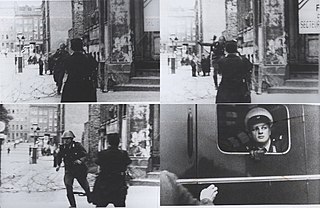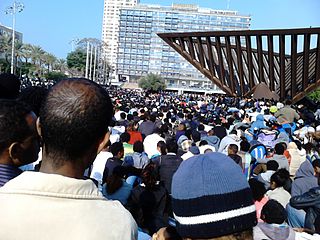Related Research Articles
The United Nations High Commissioner for Refugees (UNHCR) is a United Nations agency mandated to aid and protect refugees, forcibly displaced communities, and stateless people, and to assist in their voluntary repatriation, local integration or resettlement to a third country. It is headquartered in Geneva, Switzerland, with over 18,879 staff working in 138 countries as of 2020.

The International Organization for Migration (IOM) is a United Nations agency that provides services and advice concerning migration to governments and migrants, including internally displaced persons, refugees, and migrant workers.

A refugee, conventionally speaking, is a person who has lost the protection of their country of origin and who cannot or is unwilling to return there due to well-founded fear of persecution. Such a person may be called an asylum seeker until granted refugee status by the contracting state or the United Nations High Commissioner for Refugees (UNHCR) if they formally make a claim for asylum.
An asylum seeker is a person who leaves their country of residence, enters another country and applies for asylum in that other country. An asylum seeker is an immigrant who is making a claim to have been forcibly displaced and might have fled their home country because of war or other factors harming them or their family. If their case is accepted, they become considered a refugee. The terms asylum seeker, refugee and illegal immigrant are often confused.

The Refugee Council is a UK based organisation which works with refugees and asylum seekers. The organisation provides support and advice to refugees and asylum seekers, as well as support for other refugee and asylum seeker organisations. The Refugee Council also produces many reports and educational material relating to refugee issues, and lobbies politicians and the media on these issues. The Council works in partnership with many other refugee organisations, including the British Red Cross, Scottish Refugee Council, Welsh Refugee Council, North of England Refugee Service, Northern Refugee Centre, and Refugee Action.
World Refugee Day is an international day organised every year on 20 June by the United Nations. It is designed to celebrate and honour refugees from around the world. The day was first established on 20 June 2001, in recognition of the 50th anniversary of the 1951 Convention Relating to the Status of Refugees.

The International Catholic Migration Commission (ICMC) is an international organization that serves and protects uprooted people, including migrants, refugees, and internally displaced people, regardless of faith, race, ethnicity or nationality. With staff and programs in over 40 countries, ICMC advocates for sustainable solutions and rights-based policies directly and through a worldwide network of 132 member organizations.
People Against Suffering, Oppression and Poverty (PASSOP) is a community-based, grass roots non-profit organisation fighting for the rights of asylum seekers, refugees and immigrants in Cape Town, South Africa.
The United Nations High Commissioner for Refugees Representation in Cyprus is an office of the United Nations High Commissioner for Refugees (UNHCR) opened in August 1974 upon the request of the Government of Cyprus and the Secretary-General of the United Nations. UNHCR Representation in Cyprus was designated as Coordinator of the United Nations Humanitarian Assistance for Cyprus. UNHCR was also responsible upon the request of the Cyprus Government to examine applications for refugee status.

Refugee women face gender-specific challenges in navigating daily life at every stage of their migration experience. Common challenges for all refugee women, regardless of other demographic data, are access to healthcare and physical abuse and instances of discrimination, sexual violence, and human trafficking are the most common ones. But even if women don't become victims of such actions, they often face abuse and disregard for their specific needs and experiences, which leads to complex consequences including demoralization, stigmatization, and mental and physical health decay. The lack of access to appropriate resources from international humanitarian aid organizations is compounded by the prevailing gender assumptions around the world, though recent shifts in gender mainstreaming are aiming to combat these commonalities.

Sudanese refugees in Israel refers to citizens of Sudan who have sought refuge in Israel due to military conflict at home, and to those who moved there illegally as migrant workers. In 2008, there were 4,000 Sudanese in Israel, 1,200 from Darfur and the remainder Christians from South Sudan. The majority entered through the Israeli-Egypt border. Most live in Tel Aviv, Arad, Eilat and Bnei Brak.

African immigration to Israel is the international movement to Israel from Africa of people that are not natives or do not possess Israeli citizenship in order to settle or reside there. This phenomenon began in the second half of the 2000s, when a large number of people from Africa entered Israel, mainly through the then-lightly fenced border between Israel and Egypt in the Sinai Peninsula. According to the data of the Israeli Interior Ministry, 26,635 people arrived illegally in this way by July 2010, and over 55,000 by January 2012. In an attempt to curb the influx, Israel constructed the Egypt–Israel barrier. Since its completion in December 2013, the barrier has almost completely stopped the immigration of Africans into Israel across the Sinai border.
The Asylum Seeker Resource Centre (ASRC) is an asylum seeker support organisation in Australia. The ASRC, based in Footscray, a suburb of Melbourne, Victoria, provides aid, justice and empowerment programs to over 1000 asylum seekers living in the community seeking refugee protection. The ASRC is run by a team of over 1000 volunteers and around 100 paid staff, and is headed by former university lecturer and lawyer Kon Karapanagiotidis.
LGBT migration is the movement of lesbian, gay, bisexual and transgender(LGBT) people around the world and domestically, often to escape discrimination or ill treatment due to their sexuality. Globally, many LGBT people attempt to leave discriminatory regions in search of more tolerant ones.
A refugee crisis can refer to difficulties and dangerous situations in the reception of large groups of forcibly displaced persons. These could be either internally displaced, refugees, asylum seekers or any other huge groups of migrants.

Voluntary return or voluntary repatriation is usually the return of an illegal immigrant or over-stayer, a rejected asylum seeker, a refugee or displaced person, or an unaccompanied minor; sometimes it is the emigration of a second-generation immigrant who makes an autonomous decision to return to their ethnic homeland when they are unable or unwilling to remain in the host country.

Azezet Habtezghi Kidane is an Eritrean-born British nun and human trafficking activist working in Israel.

The term, non-Jewish African refugees, primarily refers to the Sudanese and Eritrean refugee population migrating to Israel through the Sinai Desert. Israeli policy concerning these refugees has evolved from a policy of neutrality to a policy of deterrence. These refugees began arriving in Israel in the 21st century, led by Bedouin smugglers. The current non-Jewish African refugee population in Israel is approximately 36,000.
Usumain Tukuny Baraka is a Sudanese activist and asylum seeker living in Israel. He is a leader of Israel's asylum-seeking community and the first Darfuri refugee to graduate from a Hebrew-language program in an Israeli university.

The Rwanda asylum plan was an immigration policy first proposed by the British government in April 2022 whereby people whom the United Kingdom identified as illegal immigrants or asylum seekers would have been relocated to Rwanda for processing, asylum and resettlement. Those who were successful in claiming asylum would have remained in Rwanda and they would not have been permitted to return to the United Kingdom.